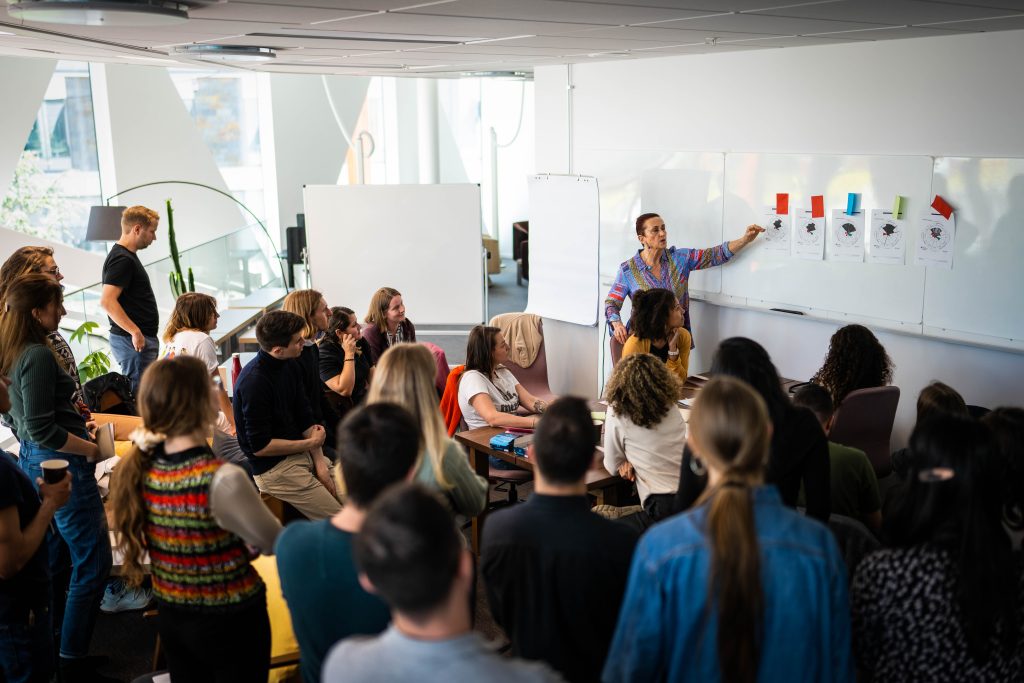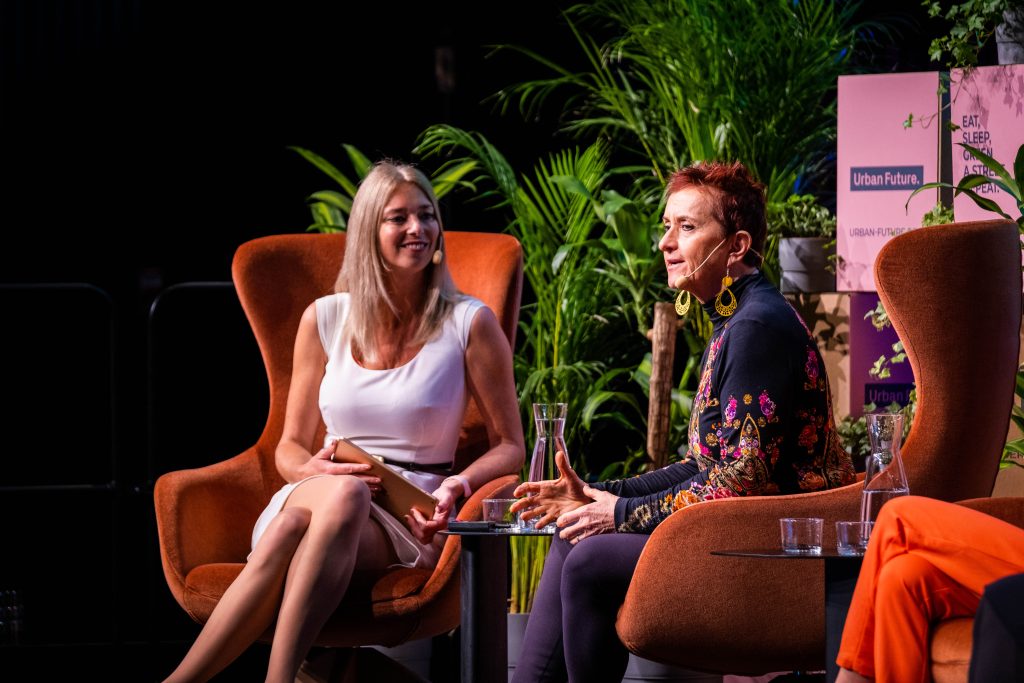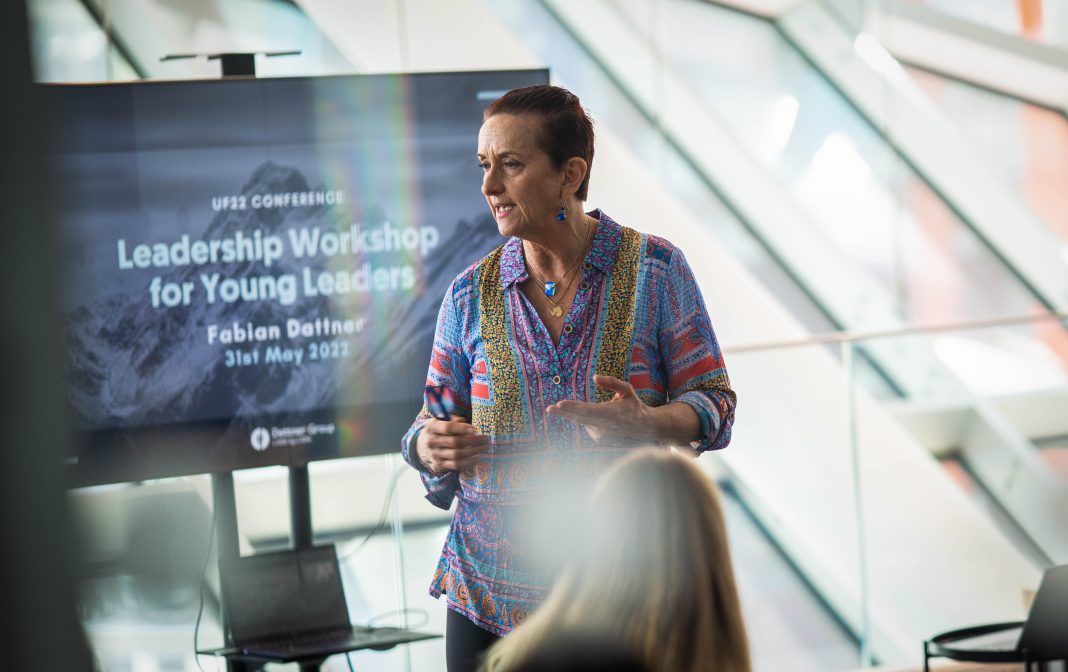As in business, real success in sustainable city transformations largely hinges on sound and equitable leadership. This requires elevating more women to positions of influence. Social entrepreneur Fabian Dattner is a die-hard advocate and activist creating a seismic shift in the landscape of leadership. We jumped at the chance to speak with her at Urban Future 22, to find out how we can all contribute to a fairer, more sustainable future, where women lead equally.
There is a huge knowing-doing gap. The tasks and challenges faced by those ‘on the ground’ in organisations are rarely understood by people at the top. For those fighting climate breakdown, it signifies slow progress at a time when we should be acting with urgency.
This is the truth that Fabian Dattner encounters daily. Yet, although some commentators are now using emotive language to express the climate crisis, Fabian is far from nihilistic.
She believes that we have many of the technical solutions needed to create liveable, enjoyable urban spaces, and the know-how and motivation to put them in place. What concerns Fabian is the “profound lack of understanding of what it will take in leadership behaviour to optimise the solutions we’re creating”.
Why Leadership Fails
As CEO and Founder of Dattner Group, Fabian’s expertise as a leadership consultant has been called upon to fix broken management structures across hundreds of companies.
Cracks tend to appear in hierarchies of around 300+. At this size, leaders focus on umbrella objectives and high-scale roadmaps, losing sight of the day-to-day processes and hardships at other levels.
This features not only in big businesses. What starts as a grassroots movement of a single person with a contagious passion may grow to a gargantuan organisation. As early adaptors and supporters get involved, rules, structure, and cultures set in to stabilise decision-making and procedure. Rather than the radicalism that breeds fast-paced experimentation and transition, change becomes bogged down and sluggish.
“As that happens, you start to get passive cultures versus innovative cultures,” Fabian suggests. To stave off atrophy, we need more of the latter.
“Innovation is a natural human predisposition when we’re trying to do something we don’t have an answer for.” That requires breaking away from rigid structures, encouraging entrepreneurial spirits, and embracing flexibility, adaptability, and opportunities to learn from trial and error.
“By nature, innovation is breaking the rules.”
For leaders to genuinely influence change, people occupying these roles need to adopt innovative mindsets. They also need to understand that impactful leadership is about coaching, not dictating.
Problems of Poor Leadership
Fabian points out that good leaders are those who have the capacity to inspire – to bring out the best in others to think, try, and do.
“The function of an executive team is to sit in the centre of interactions, facilitate, coach, develop, guide, and inspire”.
Our CityChanger’s task is to revitalise this practice – to implement processes for large transformational change and to assist leadership teams in understanding why schisms emerge and why those lower in the pipeline feel less accountable for high-level objectives.
Often, it’s because they do not feel heard, represented, communicated with, or included in decision-making processes.
This directly leads to problems that undermine operational integrity, including, Fabian reflects, a lack of clear direction, (functional) divisions, misaligned values and priorities, inconsistent behaviour, animosity, and unwarranted blame.
This is toxic. It erodes trust in leaders and their decisions. “When people don’t trust, they start to pull apart.” A fragmented team is not going to work efficiently.

Honesty Auditing
So, how can we change our leadership style?
Fabian’s starting point is to teach leaders to have the courage to listen to what people involved in the organisation really say about it – and them! What are the strengths and weaknesses, the purpose and culture?
“We call it honesty auditing.”
What is most revealing, our expert recounts, is how people react to being asked what change they would implement immediately if they had a magic wand.
A typical response is to dismiss the question, feeling that no one will listen to their answer and so it doesn’t matter what they think – it’ll never happen. This proves the organisation is ‘stuck’; it needs to change.
“The scale of the problems we’re all dealing with are multiplying, so we have to devolve power to many, many more people.”
Everyone has the capability to be innovative and effective. People at all levels have ideas for change that can be attempted. Leaders must learn how to coach and enable their teams to have strategic conversations – this validates their voices and recalibrates objectives throughout the organisation.
To achieve this effectively requires a more human language, a revised approach to the leadership model, and greater diversity of those who occupy these positions.
The Language of Equitable Leadership
In a time when people come to demand ever-more decisive climate action, leaders who refuse to act will be ousted. Those in prominent positions who listen can avoid being deposed. By nature, female leaders will fare better.
“Evidence would suggest that women are predisposed to be more collaborative, inclusive, legacy-minded,” our expert acknowledges.
And, as Fabian explains, women tend to use compassionate language that galvanises positive working relationships and collaboration. Browse the Dattner Group website, and you’ll noticed this vernacular: words like ‘wise’, ‘courage’, and ‘care’.
Although the situation is improving, leadership roles are still dominated by men. “Incumbent power doesn’t give up power easily,” Fabian laments. “They’re still estimating for women to get parity globally might be another 137 years.”
Equal representation needs a helping hand. That’s why Fabian launched a non-profit initiative that empowers and equips women to excel as leaders.
Homeward Bound
Referencing the Hero’s Journey concept, Fabian tells us that sometimes “you have to go out in order to look back and say: ‘That’s what I’m fighting for’.”
This is what links CityChangers with, of all places, the Antarctic!
The concept of taking 100 women with STEM backgrounds to the frozen waters of Antarctica each year came to Fabian in a dream, fully formed.
Homeward Bound is a 12-month leadership development programme culminating in a voyage in the most isolated and harshest environment on Earth.
By nurturing a mutually supportive environment, those on board are safe to expose and explore their insecurities together, breaking down their relationship with traditional (male-imposed) structures and rebuild an innovative, collaborative, responsive form of equitable leadership.
A strand of the programme’s strategy is to help participants approach and manage difficult conversations, which could lead to conflict – which we are “appalling at doing”, our CityChanger admits.
“The definition of a difficult conversation is the emotional stakes are high, the consequences of any decision we take are far reaching, and we don’t agree.” That’s exactly the type of scenario preventing CityChangers future-proofing their home turf.
Participants conclude the programme feeling equipped and ready to lead, having established a supportive network that helps them elevate the visibility of women leaders on a global scale.
Fabian spoke of the programme with intoxicating and vivid recollections at Urban Future 22. By this time, 700 women had already participated in Homeward Bound.

“Nothing Ventured, Nothing Gained”
Fabian followed her (literal) dream to the Antarctic. That’s a bold move. She attributes this to the ‘pirate’ side of her character – “a mental model that says, ‘Alright, I tried something I didn’t know how to do; do I have the courage to stay the course and learn from it?’”
For our CityChanger, ‘failure’ and ‘success’ are unhelpful terms. “The notion of failure is slightly terrifying.” But embracing opportunities to learn from mistakes is what connects us with that innovative spirit we need. “You have to try in order to make mistakes. Take feedback, adjust your behaviour, learn, have another go.”
“Your brain is wired to learn from increments of mistakes, not successes.”
Urban change is similar to learning a musical instrument: practice is about getting it wrong time and again but in a safe space, where failure has little consequence. Incremental learning works. We improve from it. “Always experiment where you don’t mind failing,” the expert advises.
For leadership, the incubator is an environment like Homeward Bound.
Persevering – and replicating when we get it right – leads to the results we’re after. Then we feel safe to share it in the public arena.
“It takes time and commitment,” Fabian concludes. Like the musical instrument, a new form of inclusive, equitable leadership will eventually become a natural behaviour. For now, we need to keep practicing.
Learn More
In Fabian’s dream, she even visualised a documentary team filming the “interrogation of leadership” taking place aboard the expedition. The Leadership was released in 2020.
For those interested in Fabian’s equitable leadership training, check out the introduction to Dattner Group’s Compass programme.


